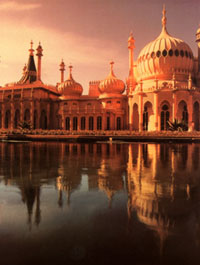ACROSS Britain the pages of Who’s Who are being riffled by civic leaders searching for celebrity endorsements as they seek to become European Capital of Culture 2008. At least 13 cities, from Brighton to Inverness, are after the title, which they hope will generate up to £100 million for the local economy and create as many as 10,000 jobs.
Cities vie to join Europe's culture club
By Simon de BruxellesGlasgow, the last British city to be European City of Culture, is, 12 years later, still reaping the benefits of the transformation in its reputation.
Applications have to be submitted by the end of next month, the choice being made from a shortlist of four or five by Tony Blair before 2004. It will be a selection process that makes his task of choosing the next Archbishop of Canterbury seem relatively simple.
Belfast is the bookies’ favourite with odds of 10-3 being offered by William Hill. Although it is the politically correct choice, the progress of the peace process is still unpredictable and many things could happen in the six years between now and 2008.
At the other end of the spectrum is Milton Keynes, the 25-1 outsider, a "garden" city famous for concrete cows and being mistaken for a dead economist.
Details of many of the artistic proposals are still under wraps, so perhaps the celebrities being used by each city to back its claim to the title are the best guide to their cultural aspirations.
The rules have been changed since Glasgow’s selection attracted £80 million of new business investment, created 6,000 jobs and helped to shake off the Scottish city’s grim image of tenement blocks and razor gangs.
Two years ago, to be fair to everyone, there were seven European Cities of Culture. This year there are two, Bruges in Belgium and Salamanca in Spain, and next year one, Graz in Austria. From 2005 the honour is being renamed European Capital of Culture and each country will take it in turns to nominate one city that will showcase the best of its local or regional culture.
The battle to make the shortlist, which will be presented to Tessa Jowell, the Secretary of State for Culture, Media and Sport, will hot up as the deadline for entries nears. Many civic leaders see this as the best opportunity they will have to attract high-spending, euro-bearing tourists to their cities.
Cities that have confirmed their applications are:
Belfast: Claims the backing of George Best and Kenneth Branagh, which neatly covers both ends of the cultural spectrum. Cultural aspirations somewhat undermined by lack of world-class theatre, opera or ballet company or an art gallery, but does have a very popular multicultural samba band.Birmingham: £142 million of investment has transformed its cultural life. Can claim ethnic diversity without the open conflict that has marred other contenders. But the Stephen Lawrence Commission report accused the city council of institutionalised racism. The bid is supported by Sir Michael Lyons, the chairman of the Board of Trustees of the City of Birmingham Orchestra and the former chief executive of the city council.
Bradford: Has chosen Lord Puttnam, the film-maker who is chairman of its National Museum of Photography, Film and Television, to head its bid. Strengths include architectural heritage and multicultural diversity, but recent riots and racial violence may count against it. Celebrity backers include Gareth Gates, who was narrowly beaten to the title of Pop Idol on Saturday evening.
Brighton and Hove: Home of Norman "Fatboy Slim" Cook and his wife, Zoë Ball, and one of the trendiest cities anywhere. Boasts Britain’s second largest annual arts festival after Edinburgh, but may be considered too near London.
Bristol: Claims the biggest stable of celebrity supporters, including J.K. Rowling, the Harry Potter author, the actor Jeremy Irons and Nick Park, the creator of Wallace and Gromit. The strength of its case that the South West has been overlooked under this Government may be its biggest weakness.
Canterbury: Lots of heritage, but short on modern culture. Celebrity backers include the actress Joanna Lumley and the chef Gary Rhodes. Would have to find a solution to horrible traffic problems.
Cardiff: Described as Europe’s fastest growing city. Boasts the Millennium Stadium, but a long-promised opera house has yet to materialise. Endorsed by the interior designer Laurence Llewelyn-Bowen, the singer Bonnie Tyler, the television chef and restaurateur Anthony Worrall Thompson and Rolf Harris.
Inverness: Highlands capital that has the backing of Charles Kennedy. Fascinating Christian heritage could prove a draw. Recent Glasgow success may rule it out.
Liverpool: Strong contender with unrivalled musical heritage dating back to the Beatles plus visual arts and literature. Recent regeneration partly thanks to EU investment. But poorly developed private sector and unrepresentative civic leadership could count against it. Backers include the newscaster Peter Sissons and the comedian Ken Dodd.
Milton Keynes: The only known contender not to have a website, despite aspirations to be a city of the future. Still a bit of a cultural desert.
Newcastle and Gateshead: Strong candidate with powerful political backing including the personal support of Tony Blair. Other celebrity backers include the actor Robson Green and the Pop Idol presenters Ant and Dec. Old Labour city politics could count against it, as could the last-minute cancellation of the Love Parade event at a cost of £15 million to local businesses.
Norwich: An outsider despite the Sainsbury Centre for Visual Arts and support from such political heavyweights as Charles Clarke. Celebrity backers include Brian Eno, the former Roxy Music keyboard player now a behind-the-scenes music figure.
Oxford: Could suffer from claims of elitism. Has backing of the band Radiohead. Blighted by traffic problems.
c o n t a c t : info@euroculture.com
